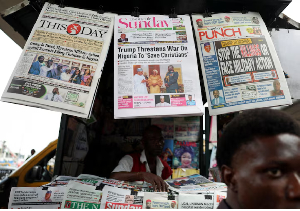... Any Attempt Will Swell Debt By $1 Billion More
Painstaking investigations carried out by THE SUN'S SPOTLIGHT TEAM has unearthed the fact that, unless and until the world market price of crude oil falls to a low of between $29 and $ 32 per barrel, there is no way government can reduce the price of petrol.
Any attempt to play to the gallery by slashing the price just to come clean on campaign promises, in a bid to get the mass of the citizenry clapping all the way to their tro-tros, taxis and private cars will cost the nation $1 billion in debt, and that should not be prudent arithmetical economics.
THE SUN found out that during the NPP’S tenure, it had in mind an $80 per barrel projection at a time the market price sold for $41, and accordingly accumulated a projected deficit of $894 million plus interest, which can be said to be bad enough in economical arithematics.
The finding has the propensity to kick in the groin the campaign message of the NDC, which had stated in opposition that it should be possible to sell a gallon at ¢2.00, and still rake in some cash into the national kitty. Currently petrol sells at ¢3.50 from a high of ¢5.10 from the pre-December 7 time, which experienced a reduction by the Ghana National Petroleum Company, for which reason a political meaning was read into it.
When THE SUN’S SPOTLIGHT team hit the investigative ground just last week it discovered that, quite apart from the global prices dropping by a certain projection government ought to play the strict disciplinarian, by zeroing in on its spending as well.
THE SUN discovered that on the average, the nation imports approximately 14 million barrels per month which is shared by the Volta River Authority (VRA) on 2 million, and the Tema Oil Refinery (TOR) on 12 million. VRA uses theirs to fire the Aboadze Thermal Plant which is pegged at 30 cents per kilowatt hour only to sell at 8 cents, thus attracting a loss of approximately 20 cents.
TOR which holds the bulk of the crude oil has government as its majority consumer, gulping down between 30 to 40 percent of the overall fuel consumption.
THE SUN can state emphatically that until government asserts its disciplinary authority on the usage of fuel, the pattern will stay unchanged and probably get even worse.
It will be recalled that a recent study of petrol drawn by the Osu Castle bunch of public office holders for December alone, was in the region of ¢80,000. 'It this is not a pointer to the garbage that goes on, then frankly I do not know what it is', a highly placed resource person at the heart of THE SUN'S investigations stated.
But the major shock remains a WORLD BANK STUDY of between 1995 and 2006; EVALUATING FISCAL & SOCIAL COSTS OF INCREASES IN DOMESTIC FUEL PRICES by David Coady and David Newhouse which targeted Columbia, Indonesia, Ghana, Malaysia, Tanzania and Zimbabwe for a case study.
THE SUN can confirm that the study established beyond doubt that, the intended reliefs and benefits for the intended target groups do not get to them, which is why there should be the urgent need to mitigate accruing costs by straightening things up.
It emerged that public transportation never really consumed a chunk of the overall fuel consumption, but rather the official use and its attendant waywardness that often throw the economic subsidies haywire. Indeed with causes and variables stated in plain language and colour, government ought to put its brain where its campaign mouth had been in order to cut its fuel consumption, and additionally pray for a global reduction in the commodity to a low of $ 29, to bring to fruition its promise of the possibility of a gallon of petrol going for ¢2.00.
General News of Tuesday, 10 February 2009
Source: THE SUN












